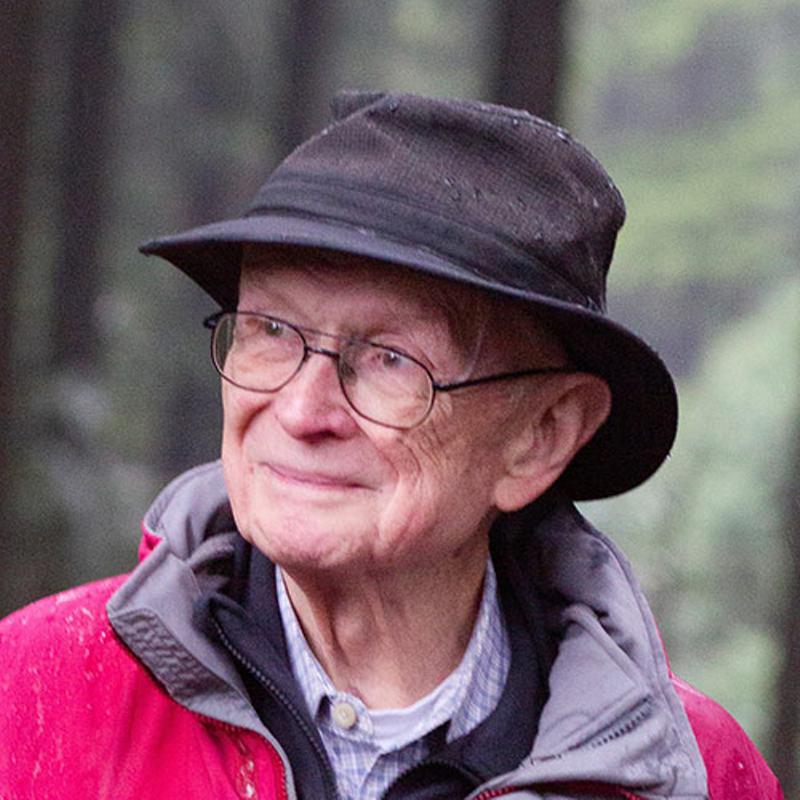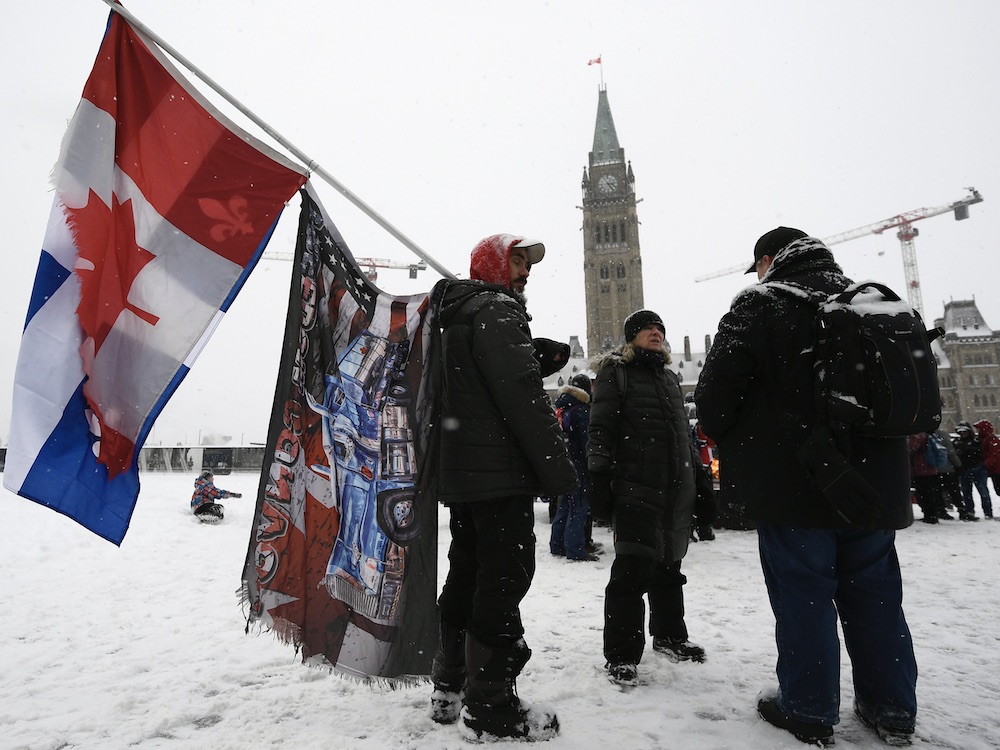- An Emergency in Ottawa: The Story of the Convoy Commission
- Sutherland House (2023)
In this short, rapidly written and perceptive book, journalist Paul Wells has given us very useful insights into the “Freedom Convoy” crisis in the winter of 2022, and what it taught us about ourselves. But in looking closely at one crisis, both Wells and the Rouleau Commission ignore the larger crisis that brought the convoy to Ottawa.
The back story of the convoy is a long one. Many citizens of the self-styled “advanced” nations have spent the last decade questioning their own institutions: their courts, their legislatures, their education systems, their health care and even the value of their version of democracy.
The most spectacular example of such self-questioning is of course the U.S. With hindsight, we can see that Ronald Reagan began that critique over 40 years ago when he proclaimed that “Government is the problem”— that is, public institutions created and sustained by democratic votes. Somehow that assertion did not seem as subversive then as it does now, after Donald Trump arrived to heap scorn on the “deep state” and all its branches and agencies, from the CIA and FBI to the Centers for Disease Control.
Canada followed in Reagan’s footsteps, endorsing free markets and deregulation and believing that countries could grow bigger if only their governments would grow smaller. We told ourselves we were better than the Americans (health care, mostly) but as the years went by we realized our salaries had been stagnating just as long as the Americans. Our country was stagnating too.
The pandemic arrived. Some of us went from banging pots in honour of our health-care workers every evening, to swarming around Vancouver General Hospital to harass those same workers as they reported for duty or left for home.
Some of us, in fact, thought the whole response to COVID-19 was way out of line, especially when the vaccines arrived and became the price of readmission to society.
Freedom Convoy as political critique
Some of us climaxed our critique of Canadian institutions by sending a “Freedom Convoy” to occupy Ottawa while other groups blockaded the border at Windsor, Ontario and Coutts, Alberta. Some of us watched the convoys with horror; Pierre Poilievre, leader of the Conservative Party of Canada, welcomed them. Some of us extended our institutional critiques to the Ontario provincial government, the Ottawa municipal government and numerous police forces. It got messy.
Eventually, of course, Justin Trudeau invoked the Emergencies Act and the convoys withdrew. And eventually, as the Emergencies Act requires, an inquiry, now known as the Rouleau Commission, was held to ascertain whether the act had been properly invoked.
As Wells puts it, “the question facing Rouleau wasn’t who was popular, it wasn’t even whether the occupiers should be dispersed, but about whether they were dispersed correctly. It was whether the Trudeau government chose the appropriate legal instrument to achieve a policy goal.”
That goal might have been summarized as “peace, order and good government,” all of which had been scarce in Ottawa after the convoy moved in. The country had been scandalized and mortified by the confused and inept response of governments and their agents. The convoy represented a very small fraction of the population, a fraction who rejected science, who didn’t care about infecting their kids, other people’s kids, or for that matter their own grandparents. And government institutions seemed unable to deal with the convoy.
But as Wells observes, “Freedom of expression and association aren’t reserved for people saying popular things.”
The convoy people had as much right to be loudly pigheaded as the rest of us, and to seek redress of their grievances whether real or delusional.
Stress reveals character
You might even argue that the protesters had done us all a favour by stressing our institutions — especially the police and three levels of government — until they revealed their true selves.
If so, it was a confusing revelation. Many Canadians were appalled to see the Ottawa Police Service’s chaotic response to the convoy’s arrival. Wells tells us that Ottawa Police Chief Peter Sloly would sometimes announce how many officers he needed from the Ontario Police Service and the RCMP, without ever having talked to those organizations. The OPP and the Mounties in turn set up an Integrated Planning Team that didn’t include Ottawa. Meanwhile, Sloly burned through three “event commanders” (senior officers responsible for dealing with the convoy) in two weeks.
Eventually Robert Bernier became the last event commander. “He took the job,” Wells writes, “on condition that Sloly be barred from telling him what to do.” Bernier welcomed the offers of help he got from the OPP and RCMP, and together the cops put together a plan to de-escalate the occupation. The next day, Feb. 14, Trudeau invoked the Emergencies Act, and by Feb. 20 the trucks were off Parliament Hill.
The Rouleau Commission wanted to know if the act had changed anything in Bernier’s plan. He told them it hadn’t, but it had helped.
Wells reports another question put to Bernier. “But was it necessary? ‘Hard for me to say,” Bernier replied. “I did not get to do the operation without it.’”
As an institution, the police had finally got their act together, but in the process they’d looked like doofuses. One person, Peter Sloly, had stalled the response of all the police forces involved; one person, Robert Bernier, had kick-started it with help from the OPP and RCMP.
Wells gives a lot of credit to police liaison teams, which try to defuse confrontations without violence. Those watching the occupation at home were often furious to see cops seeming to be on good terms with the convoy people. But the cops knew better: a violent resolution might clear Parliament Hill, but serious injuries or deaths would create martyrs and a political disaster.
Wells singles out Insp. Marcel Beaudin of the OPP Indigenous Policing Bureau as a major force behind the liaison teams. The concept of such teams emerged after Ipperwash, when the OPP had raided a camp of protesters and killed one of them, Dudley George. Liaison teams eventually emerged as a far preferable response to Indigenous protests, and they worked well in dealing with the convoy protesters.
Wells spends a chapter on the protesters themselves, mostly to show that they were a very mixed bag, the heirs to decades if not centuries of anti-vaccination arguments by both left and right. And vaccines weren’t the only thing the convoy objected to.
As Well observes, “people who were angry about vaccines were almost always angry about other stuff too.” And the convoy seemed very much in the spirit of United We Roll in 2019.
Was the convoy really about vaccines?
“It’s fair to wonder, then,” Wells writes, “whether the convoy was really about vaccination requirements for truckers, given that most of the convoy protesters weren’t truckers and most truckers were happily vaccinated. One might ask whether the convoy was about vaccines at all. Maybe it was just about hating Justin Trudeau. Clearly, for most of the protesters, to some extent it was both.”
Wells emphasizes the protesters’ diversity of thought (and often the diversity of their ignorance) to contrast them with the Trudeau government’s attitude: “the occupiers were a tightly-knit and strongly determined bundle of malevolence that could not possibly be spoken to. What you learned on hearing these people speak, however, was that they were a bunch of strangers who disagreed about many things.”
And as tightly as the Liberal caucus normally conducts itself, even it had a dissident in Joël Lightbound, MP for a Quebec City riding. At a news conference, Lightbound had kind words for at least some of the convoy protesters, but few for his own government, which he saw as unwilling to adapt its response as the pandemic changed.
“From a positive and unifying approach,” Wells quotes Lightbound, “a decision was made to divide and to stigmatize. I fear that this politicization of the pandemic risks undermining the public’s trust in public-health institutions.”
Some might argue that the public’s trust in Canadian public health was already in shreds, but Lightbound seems to have suffered no consequences for his outburst. As an institution, the Liberal government seemed able to accept Lightbound’s criticisms better than it could accept that of former minister of justice Jody Wilson-Raybould.
Making the act the only option
Wells argues that if the Trudeau government wasn’t listening even to its own backbenchers, it was far less likely to listen to the protesters. And that refusal exposed a fatal flaw in the institution of government itself. If it would listen only to those it trusted, it would by definition act on insufficient information. It hadn’t even opened a back channel to the protesters, and when deputy minister Rob Stewart suggested something like that to his boss Marco Mendicino, Mendicino turned him down. The Emergencies Act was now the only option.
Wells notes that “Trudeau and his Attorney General David Lametti refused to waive solicitor-client privilege, so we can’t know how they justified their decision, even to themselves.”
The Trudeau government survived the Rouleau Commission’s judgment, which appears to vindicate Trudeau’s refusal to listen to the protesters. The commission also distracted the public’s attention from the pandemic that was the supposed trigger for the Freedom Convoy.
But the protesters and their sympathizers have little reason to accept defeat. Many remain misinformed about both COVID-19 and the nature of Canadian government. Some just hate Justin Trudeau. Very few will vote Liberal or NDP in the next election. Pierre Poilievre saw a neglected constituency, and seized the opportunity to welcome them to the Conservative party. Whether he will actually listen to them if he achieves power is another story.
And yet another story is the absence of any kind of independent inquiry into the pandemic and the response to it by Canadians and their institutions. Such an inquiry would deal not with Justin Trudeau’s response to a splinter group, but with all Canadian governments’ response to a disease that has so far killed at least 52,000 Canadians and seems likely to kill many more. It might also look into the impact on the 800,000 Canadians or more who have experienced long COVID.
In her history of the Spanish flu, author Laura Spinney observes that “We remember wars and then gradually forget them, while we forget pandemics and then gradually remember them.”
Canada, like most of the world, is busy forgetting this pandemic even as it goes on killing. ![]()
Read more: Rights + Justice, Coronavirus, Federal Politics

















Tyee Commenting Guidelines
Comments that violate guidelines risk being deleted, and violations may result in a temporary or permanent user ban. Maintain the spirit of good conversation to stay in the discussion and be patient with moderators. Comments are reviewed regularly but not in real time.
Do:
Do not: